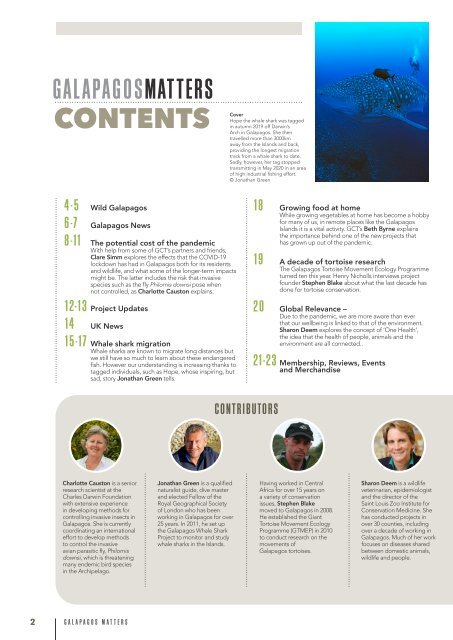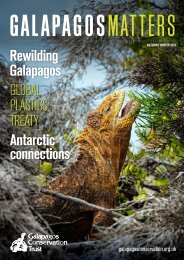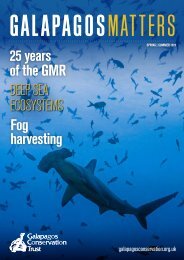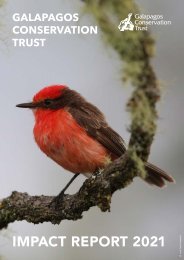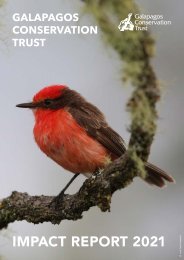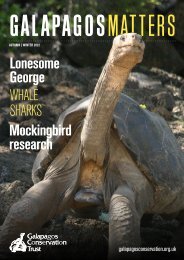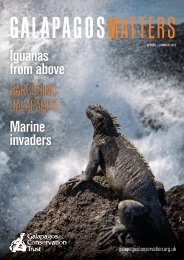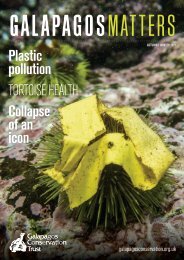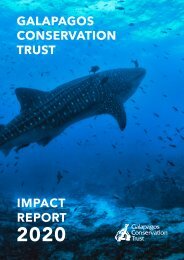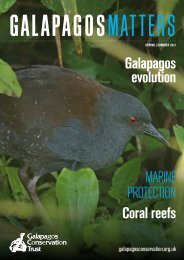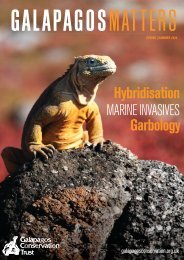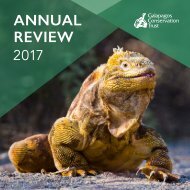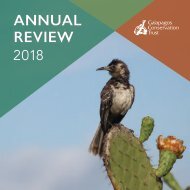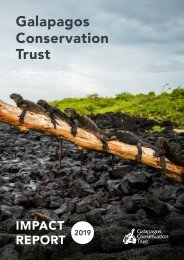You also want an ePaper? Increase the reach of your titles
YUMPU automatically turns print PDFs into web optimized ePapers that Google loves.
GALAPAGOSMATTERS<br />
CONTENTS<br />
Cover<br />
Hope the whale shark was tagged<br />
in autumn 2019 off Darwin’s<br />
Arch in <strong>Galapagos</strong>. She then<br />
travelled more than 3000km<br />
away from the Islands and back,<br />
providing the longest migration<br />
track from a whale shark to date.<br />
Sadly, however, her tag stopped<br />
transmitting in May <strong>2020</strong> in an area<br />
of high industrial fishing effort.<br />
© Jonathan Green<br />
4-5 Wild <strong>Galapagos</strong><br />
6 -7 <strong>Galapagos</strong> News<br />
8 -11 The potential cost of the pandemic<br />
With help from some of GCT’s partners and friends,<br />
Clare Simm explores the effects that the COVID-19<br />
lockdown has had in <strong>Galapagos</strong> both for its residents<br />
and wildlife, and what some of the longer-term impacts<br />
might be. The latter includes the risk that invasive<br />
species such as the fly Philornis downsi pose when<br />
not controlled, as Charlotte Causton explains.<br />
12-13 Project Updates<br />
14 UK News<br />
15 -17 Whale shark migration<br />
Whale sharks are known to migrate long distances but<br />
we still have so much to learn about these endangered<br />
fish. However our understanding is increasing thanks to<br />
tagged individuals, such as Hope, whose inspiring, but<br />
sad, story Jonathan Green tells.<br />
18 Growing food at home<br />
While growing vegetables at home has become a hobby<br />
for many of us, in remote places like the <strong>Galapagos</strong><br />
Islands it is a vital activity. GCT’s Beth Byrne explains<br />
the importance behind one of the new projects that<br />
has grown up out of the pandemic.<br />
19 A decade of tortoise research<br />
The <strong>Galapagos</strong> Tortoise Movement Ecology Programme<br />
turned ten this year. Henry Nicholls interviews project<br />
founder Stephen Blake about what the last decade has<br />
done for tortoise conservation.<br />
20 Global Relevance –<br />
Due to the pandemic, we are more aware than ever<br />
that our wellbeing is linked to that of the environment.<br />
Sharon Deem explores the concept of ‘One Health’,<br />
the idea that the health of people, animals and the<br />
environment are all connected..<br />
21-23 Membership, Reviews, Events<br />
and Merchandise<br />
CONTRIBUTORS<br />
Charlotte Causton is a senior<br />
research scientist at the<br />
Charles Darwin Foundation<br />
with extensive experience<br />
in developing methods for<br />
controlling invasive insects in<br />
<strong>Galapagos</strong>. She is currently<br />
coordinating an international<br />
effort to develop methods<br />
to control the invasive<br />
avian parasitic fly, Philornis<br />
downsi, which is threatening<br />
many endemic bird species<br />
in the Archipelago.<br />
Jonathan Green is a qualified<br />
naturalist guide, dive master<br />
and elected Fellow of the<br />
Royal Geographical Society<br />
of London who has been<br />
working in <strong>Galapagos</strong> for over<br />
25 years. In 2011, he set up<br />
the <strong>Galapagos</strong> Whale Shark<br />
Project to monitor and study<br />
whale sharks in the Islands.<br />
Having worked in Central<br />
Africa for over 15 years on<br />
a variety of conservation<br />
issues, Stephen Blake<br />
moved to <strong>Galapagos</strong> in 2008.<br />
He established the Giant<br />
Tortoise Movement Ecology<br />
Programme (GTMEP) in 2010<br />
to conduct research on the<br />
movements of<br />
<strong>Galapagos</strong> tortoises.<br />
Sharon Deem is a wildlife<br />
veterinarian, epidemiologist<br />
and the director of the<br />
Saint Louis Zoo Institute for<br />
<strong>Conservation</strong> Medicine. She<br />
has conducted projects in<br />
over 30 counties, including<br />
over a decade of working in<br />
<strong>Galapagos</strong>. Much of her work<br />
focuses on diseases shared<br />
between domestic animals,<br />
wildlife and people.<br />
2 GALAPAGOS MATTERS


